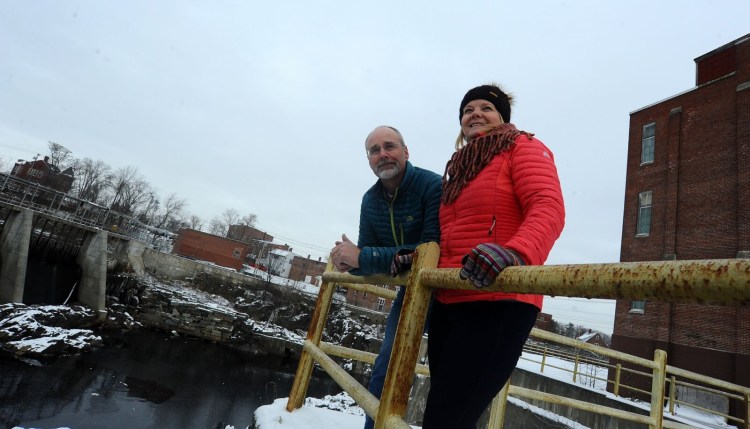Bigelow Brewing was selected to receive funding through a competitive grant program to help with the business’ revitalization of the former Solon Manufacturing Building in downtown Skowhegan.

The former Chapter 11 Inc. building, newly purchased by Bigelow Brewing, has the power on for the first time in many years on Feb. 12. Morning Sentinel file photo by Michael G. Seamans
Jeff Powers, co-owner of Bigelow Brewing, said on Friday morning that their business was awarded $32,590 to assist with architectural and engineering needs at the historic 7 Island Ave. location.
The Maine Development Foundation’s Maine Downtown Center awarded the money to the Powerses through the REvitalizeME sub-grant program, which is funded by the Paul Bruhn Historic Revitalization Grants Program of the National Park Service, Department of Interior. The sub-grant program supports economic development in rural towns.
The foundation partnered with the Maine Historic Preservation Commission to secure the funds.
“Bigelow’s project was chosen through a competitive grant process and is one of six projects in the state to receive REvitalizeME National Park Service Sub-grant funding,” Main Street Skowhegan said in a Facebook post.
The funding will allow Jeff and Pam Powers to work with their architectural firm to see what needs to be done structurally to the building as well as plan out what each floor will look like. Artifex, an architectural and engineering firm out of Bangor, will be working with Bigelow Brewing to complete the project.
In February, the company was awarded a $50,000 downtown tax increment financing grant to continue to develop the property, allowing the owners to reroute sewer lines, repair the roof, secure the windows and remove an old boiler.
The couple plans to turn the first floor of the 80,000-square-foot building into a production facility, complete with a 15-barrel brew house and seating and band area.
On Friday, Jeff Powers said that though things may change because of COVID-19, the couple hopes to move their production facility over to the downtown space and have it operating by October.
Right now, he said that their main focus is to figure out what each floor will look like and get the first floor production space up and operating.
“We’re aiming to have this done by the fall, but that’s entirely based on everything else that’s going on,” Powers said.
Though logistics are still being planned, they hope to convert the second and third floors into residential living spaces. The fourth floor will be converted into restaurants, a music venue and a green rooftop deck. The basement of the building, they said, will be used for residential parking.

The building was built in 1922 and originally housed Maine Spinning Co., according to information provided by Christian Savage, executive director of Somerset Economic Development Co. The company reached its height from the 1940s to the 1970s, when it employed 300 and produced 1.5 t0 2 million pounds of yarn for markets around the country.
The mill was later acquired by Solon Manufacturing, which operated until 2005 and made a variety of wooden, plastic and metal products for medical, industrial and food markets. The building has changed hands several times but has remained mostly vacant since then, though Chapter 11 Inc., a discount store, occupied the space for a brief period of time beginning in 2014.
Town Manager Christine Almand has previously said that seeing the mill repurposed has positive effects on the local community.
“We’ve seen many mills being repurposed throughout the state, and we are super excited about seeing the one right in the heart of our town having a project like this going forward,” Almand said in February. “It will definitely feed into the future and what we want to see with the Run of the River and all of our efforts.”
Anne Ball, program director at Maine Downtown Center, said in the news release announcing the grant, “We are pleased to distribute these awards for what we believe will be catalytic projects in Maine downtowns. The program is set out to drive the connection between economic development and historic preservation.”
Since the pandemic reached the state of Maine, Powers said that retail business has dropped off and they have had to lay off all but two of their 11 employees. While they cannot open up their dining space, they have been taking online orders for cans for curbside pickup.
Powers said that their business was able to get funding through the paycheck protection program, which will allow them to bring back their full-time employees.
“We’ve been in talks with our employees about how we can socially distance,” Powers said. “We don’t want to put anyone in danger.”
He said that starting next week, full-time employees will return, and they are working to figure out what to do for part-time staff members.
“The support that we have seen from the community has been tremendous,” Jeff Powers said. “From the state level, down to the town, we feel very much a part of this community.”
Send questions/comments to the editors.




Success. Please wait for the page to reload. If the page does not reload within 5 seconds, please refresh the page.
Enter your email and password to access comments.
Hi, to comment on stories you must . This profile is in addition to your subscription and website login.
Already have a commenting profile? .
Invalid username/password.
Please check your email to confirm and complete your registration.
Only subscribers are eligible to post comments. Please subscribe or login first for digital access. Here’s why.
Use the form below to reset your password. When you've submitted your account email, we will send an email with a reset code.